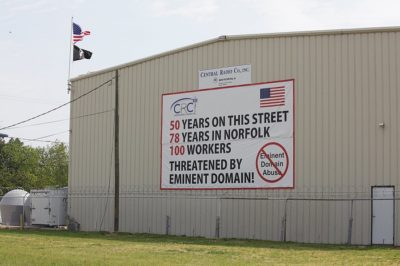 Opponents of eminent domain won an important victory this week when the US Supreme Court ruled against a city that had ordered removal of an anti-eminent domain sign.
Opponents of eminent domain won an important victory this week when the US Supreme Court ruled against a city that had ordered removal of an anti-eminent domain sign.
The justices did this by vacating a US Fourth Circuit Court of Appeals ruling and then ordering the court to reconsider a decision that had allowed the city of Norfolk, Virginia, to tell a private business to remove the sign. The Supreme Court’s order was unsigned and only four sentences.
“This is a twin victory for free speech and property rights,” Michael Bindas, a senior attorney at the Institute for Justice, said of the Supreme Court’s action in Central Radio Company v. City of Norfolk.
The case began in 2010 when the Norfolk Redevelopment and Housing Authority tried to use eminent domain to seize the property owned by Central Radio Inc., a family-owned business, and turn it over to Old Dominion University. Not surprisingly Central Radio’s owners, the Wilson family, fought back.
One of the ways they protested was to put a large banner containing the American flag and the following statement on their building: “50 years on this street/78 years in Norfolk/100 workers/Threatened by eminent domain!”
Discover The Only Way Back To True Freedom And Liberty In America…
The 365-square-foot banner faced Hampton Boulevard, which the Fourth Circuit Court described as a major six-lane highway. The banner was designed to be visible several blocks away.
Shortly after the Wilsons put up the banner, an unidentified official at Old Dominion University, the very institution that would profit from the land grab, filed a complaint with the city of Norfolk, Washington Post blogger Radley Balko reported. The city’s zoning officials ordered the Wilsons to remove the banner, contending it violated the sign code because it was too big and threatened “public safety.”
Story continues below the video
The Wilsons covered the sign to prevent $1,000-a-day fines and challenged the city’s action by filing a federal lawsuit with the help of the Institute in May 2012. In their suit, the businesspeople contended that the city violated their First Amendment right to free speech and their 14th Amendment right to equal protection under the law.
“The plaintiffs alleged that the sign code was unconstitutional because it subjected their display to size and location restrictions, but exempted certain ‘flag[s] or emblem[s]’ and ‘works of art’ from any similar limitations,” Judge Barbara Milano Keenan wrote in the Fourth Circuit’s opinion.
Supreme Court Expands Free Speech
Both a US district court and the Fourth Circuit Court of Appeals agreed with Norfolk and said the city’s policy was constitutional. The Supreme Court, though, disagreed and said the Fourth Circuit’s decision may conflict with a new Supreme Court decision, Reed vs. Town of Gilbert, Arizona. In that case, the US Supreme Court ruled that codes that ban or regulate signs based upon content are unconstitutional.
Learn About The ‘Real Constitution’ And What The Founders Truly Intended
The Reed case involved a church that used lawn signs to advertise the location of its services. A town had ordered the congregation to remove the signs.
“Because the Code, on its face, is a content-based regulation of speech, there is no need to consider the government’s justifications or purposes for enacting the Code to determine whether it is subject to strict scrutiny,” Supreme Court Justice Clarence Thomas wrote in Reed.
Said Robert Frommer, an Institute for Justice attorney, “The Supreme Court has made clear that government does not get to play favorites with the First Amendment by arbitrarily deciding who gets to speak and what they get to say.”
The Virginia-Pilot newspaper called the Supreme Court’s ruling in the Norfolk case a victory “for anyone who believes in the right to speak out when government abuses its power.”
Ironically enough, the Wilsons and their employees at Central Radio no longer have to worry about eminent domain. In 2013 the Virginia Supreme Court ruled that the city’s attempt to take their land was illegal under state law and effectively ended the land grab.
Do you believe eminent domain should ever be allowed? If so, when? Share your views on eminent domain in the section below:
You’re Being Watched: 7 Sneaky Ways The Government Is Tracking Your Every Move. Read More Here.
 Off The Grid News Better Ideas For Off The Grid Living
Off The Grid News Better Ideas For Off The Grid Living



